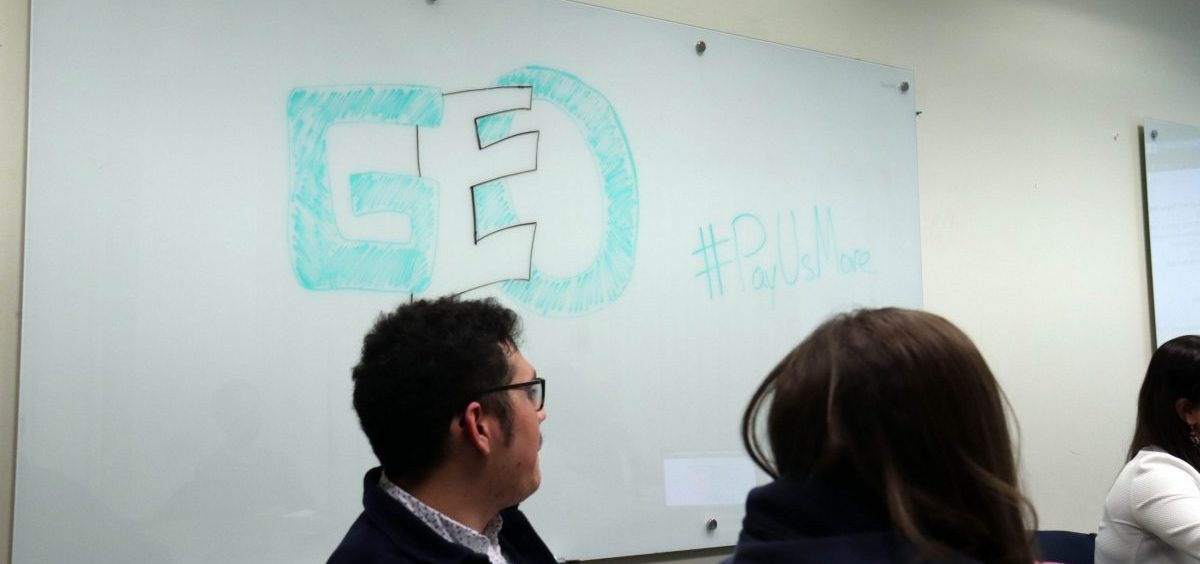
An Ohio University graduate student organization advocates for better wages and healthcare
By: Taylor Burnette
Posted on:
ATHENS, Ohio (WOUB) — The minimum stipend per semester for a full graduate student appointment at Ohio University is $3,900 for 20 hours a week, which is the most they can work.
While the stipends vary by program and come with some employment benefits, many graduate students say they feel it’s not enough to survive on.
“The university has talked about working on the mental health of graduate students,” Courtney Silver-Peavey, a fourth-year Ph.D. student. “Pay us more. We will be happier, we’ll be healthier, we will do a better job. Overall, if you are in better physical and mental health, your job is going to go better. Our research is going to be better.”
Silver-Peavey studies amphibians and spends what little free time she has – when she isn’t taking soil samples and watching hours of frog footage – advocating for the better treatment of graduate students at Ohio University.
She is part of the Graduate Employee Organization, also known as GEO. Originally started around six years ago, GEO was brought back to Ohio University in 2020 to increase health insurance subsidies. From there, Silver-Peavey said the group has

Recently GEO circulated a petition supporting a 100% healthcare subsidy and a 12% stipend increase based on inflation and the raised minimum wage for graduate students with assistantships, as well as waiving the general fee for all graduate students. But so far, nothing has changed.
Currently, the healthcare subsidy covers 60% of graduate students with assistantship’s insurance premium, an improvement GEO advocated for, from the 10% covered a few years ago, Silver-Peavey said. Some universities similar to OU cover different percentages. Kent State, for example, covers 70%.
Other universities in Ohio, like the University of Cincinnati, pay a higher minimum stipend. For a Ph.D. student with a graduate assistantship, the minimum is around $6,500 per semester. And Miami University waives up to 50% of the general fee for graduate assistants.
GEO surveyed over 500 graduate students at Ohio University and found major concerns about healthcare, stipends and general fees.
“It showed that graduate students are under extreme financial stress,” Silver-Peavey said.
Viktoria Marinova is a member of GEO and a fourth-year mass communication Ph.D. candidate.
“I’m tired of not feeling comfortable to get medical assistance because I’m worried about being burdened with debt, which is actually the case right now,” Marinova said. “I ended up in the ER with COVID. And I owe a lot of money to the hospital. I have sleepless nights trying to figure out how I’m going to pay my bills, just trying to survive.”
As a fourth-year student, Marinova said she no longer teaches and no longer receives funding, making medical bills additionally burdensome.
“I feel like I deserve to be treated better, just like the rest of my peers deserve to be treated better,” Marinova said. “We should not be struggling considering how much blood, sweat and tears we provide to the university.”
Julia Joos, a fifth-year Ph.D. candidate in biological sciences, said she could not afford to attend OU without the financial support of her family.
“I knew that education in the U.S. was going to be a lot more expensive,” said Joos, who is from Germany. “I honestly couldn’t even imagine how different it is. And like the magnitude of it … It’s definitely the first time in my life that I actually have financial stress and worries. I know, for most people who do study in the U.S., that starts way earlier during their undergrad.”
With data in hand, GEO has been focusing on graduate students’ main concerns, advocating through a letter-writing campaign as well as discussions with President Hugh Sherman. So far, the demands have not been met.
Ohio University’s Graduate Council, which Silver-Peavey is also a member of, is currently doing a review of graduate student stipends and comparing this to stipend information from peer institutions with similar demographics. The Graduate Council can make recommendations, Silver-Peavey said, but not make any direct changes.
Ohio University spokesperson Daniel Pittman said that Sherman regularly meets with Graduate Student Senate representatives and GEO representatives to discuss concerns. However, Pittman did not comment on the actions they would take if the Graduate Council’s review shows that graduate students are struggling.
“The Graduate Council anticipates the committee review of current graduate student stipends to continue into Spring Semester 2023, and it would be premature to discuss possible recommendations or actions until their work is complete,” Pittman said in an email.
Silver-Peavey said that sometimes graduate students are treated like students, and other times they are treated like employees whenever it is convenient for the university. But GEO is seeking fair treatment as students and fair treatment as employees.
Frogs have always been Silver-Peavey’s dedicated passion, a career she has worked toward and dreamed of for years. Taking one look around her office, alongside photos of loved ones and stacks of papers, is every frog-themed item you can imagine: headphones, posters, stickers and cards from friends with frogs on the front.
But not all of her time is spent studying, she said. Between Graduate Student Senate, which she is also a part of, Graduate Council and GEO, she is busy.
“I am not special, the other people in GEO are not special,” Silver-Peavey said. ‘’We’re not leaders among leaders, right? We’re just graduate students who are fed up.”
But they are graduate students who have a goal of advocating for other graduate students, she said.
“We want graduate students just to know that their voice can be heard, and we want to hear it.”

